Diplomatic Bluebook 2019
Chapter 3
Japan's Foreign Policy to Promote National and Global Interests
2 Response to Global Issues
(1) 2030 Agenda for Sustainable Development
The “2030 Agenda for Sustainable Development (the 2030 Agenda)” is a set of international development goals to be achieved by 2030, which was adopted by the UN Summit in September 2015 as a successor to the Millennium Development Goals (MDGs) formulated in 2001. The 2030 Agenda sets out the international development goal of realizing a society that is sustainable, diverse, and inclusive, and where “no one is left behind,” by 2030.
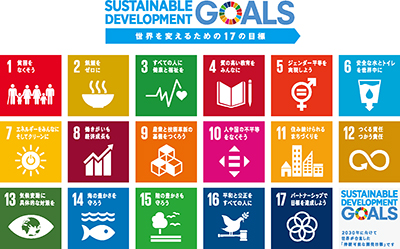 Logos of all 17 goals under the SDGs (Source: UN Information Center)
Logos of all 17 goals under the SDGs (Source: UN Information Center)The 2030 Agenda lists the “Sustainable Development Goals (SDGs)” consisting of 17 goals and 169 targets that are interrelated and closely linked to each other, and which serve as development goals for the whole of the international community including developed countries.
Japan has consistently and proactively contributed to discussions and negotiations for the 2030 Agenda even before full-fledged discussions got underway in the international community. After the adoption of the 2030 Agenda, Japan first built a foundation for the implementation of the SDGs by establishing the SDGs Promotion Headquarters headed by the Prime Minister and composed of all cabinet ministers as members, formulating the SDGs Implementation Guiding Principles to serve as Japan's guidelines in the implementation of the SDGs, and establishing eight priority areas that Japan will place particular focus on. Furthermore, Japan puts great importance on public-private partnership for the implementation of the SDGs, and has to date held six Round Table Meetings on the promotion of the SDGs, bringing together stakeholders from a wide range of fields including NGOs, academia, the private sector, and international organizations. It also engages in the exchange of views on initiatives by local governments and businesses toward the promotion of the SDGs, measures for the empowerment of women and the next generation, and strengthening cooperation with the international community.
To date, six meetings of the SDGs Promotion Headquarters have been held. At the sixth meeting held in December 2018, the Expanded SDGs Action Plan 2019 was unveiled, covering the main initiatives to be undertaken by MOFA as well as other relevant government ministries toward the achievement of the SDGs. This Action Plan established three pillars for Japan's SDGs initiatives: (1) the promotion of Society 5.0 that is tied in with the SDGs and achieved through efforts by the public and private sectors; (2) regional revitalization driven by the SDGs; and, (3) empowerment of the next generation and women as the future leaders who will take up the role to realize the SDGs. In line with these, efforts will be further advanced toward the achievement of the SDGs, in both the aspects of domestic implementation and international cooperation. This Action Plan also clearly sets out Japan's contribution to the building of a resilient and environmentally-friendly nation and to “human resource development” in the world based on the notion of human security, as well as the main SDGs themes that Japan will exert its leadership for in the international community as the chair of the G20 in 2019.
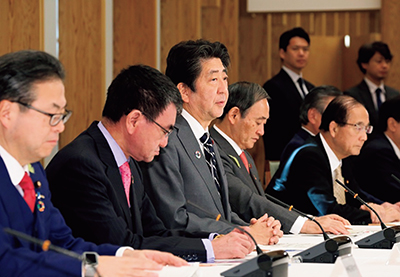 The sixth meeting of the SDGs Promotion Headquarters (December 21, Tokyo; Photo: Cabinet Public Relations Office)
The sixth meeting of the SDGs Promotion Headquarters (December 21, Tokyo; Photo: Cabinet Public Relations Office)On the same day as the sixth meeting of the SDGs Promotion Headquarters, the conferment ceremony for the second Japan SDGs Award was held to commend companies and organizations that have put in place excellent initiatives toward the realization of the SDGs. This year, the Japan Food Ecology Center, Inc. received the SDGs Promotion Headquarters Chief (Prime Minister's) Award for its efforts toward the effective utilization of food waste.
Through opportunities such as TICAD7 and the G20 Osaka Summit in 2019, which has put the world's attention on Japan, Japan is exerting its leadership and presenting to the international community its stance as a strong leader in the promotion of the SDGs. Japan will further promote and strengthen its concrete initiatives, in order to present its achievements as the G20 chair at the SDG Summit scheduled for September 2019.
To achieve the SDGs by 2030, United Nations Conference on Trade and Development (UNCTAD) estimates that it is necessary to overcome a funding gap of as much as approximately 2.5 trillion US dollars (approximately 280 trillion yen) every year. To contribute to revitalizing discussions about innovative financing mechanisms, including an international solidarity tax, so as to overcome this funding gap, Japan assumed position as the chair of the Leading Group on Innovative Financing for Development in January 2019, a group that is made up of voluntary countries and organizations.
A Human Security
Human security is a concept aiming at creating a community in which people can fully develop their potential through protecting all individuals, and at the same time empowering them to solve their own problems. Japan identifies human security as one of its diplomatic pillars, and has positioned it as a guiding principle that lies at the roots of Japan's development cooperation in the Development Cooperation Charter approved in 2015. To date, Japan has led discussions in the United Nations and other fora, and supported the dissemination and implementation of human security by UN organizations through the contribution of a cumulative total of about 46.8 billion yen to the UN Human Security Trust Fund established in 1999 by Japan's initiative. In the area of bilateral cooperation, Japan has also put effort into the dissemination and implementation of this concept through support for Grant Assistance for Grassroots Human Security Projects. The 2030 Agenda is also based on principles such as “people-centered” and “leave no one behind,” and its core reflects the concept of human security.
B Approaches in the Area of Disaster Risk Reduction
200 million people around the world are affected by disasters every year (90% of the victims are citizens of developing countries) and the annual average loss incurred by natural hazards extends to 250 to 300 billion US dollars. Disaster risk reduction is essential for realizing poverty eradication and sustainable development.
Japan makes use of the knowledge of disaster risk reduction and mitigation, built up through its numerous experiences with disasters, to promote international cooperation. At the Third United Nations World Conference on Disaster Risk Reduction held in Sendai in March 2015, Japan took the lead in the adoption of the “Sendai Framework for Disaster Risk Reduction 2015-2030,” a guideline for efforts by the international community. Japan announced the “Sendai Cooperation Initiative for Disaster Risk Reduction” which includes provision of 4 billion US dollars toward cooperation and training of 40,000 people in the four years from 2015 to 2018.
Coinciding with World Tsunami Awareness Day (November 5), proposed by Japan and enacted unanimously at the 70th UN General Assembly held in December 2015, Japan has been hosting the High School Students Summit on “World Tsunami Awareness Day” since 2016. Held three times to date, high school students from countries around the world are invited to this event, and through practical learning about Japan's history of tsunami, recovery from earthquake disasters, and preparations for the Nankai Trough earthquake, the participants make proposals for future challenges and implementation in their home countries.
The first High School Students Summit on “World Tsunami Awareness Day” was held in Kuroshio Town, Kochi Prefecture on November 25 and 26, 2016, and the second one was held in Ginowan City, Okinawa Prefecture, on November 7 and 8, 2017. The third event was held in Wakayama City, Wakayama Prefecture, on October 31 and November 1, 2018, and was attended by about 380 high school students from 48 countries including Japan. Japan will continue to share the experiences and lessons drawn from past disasters with the world, and to promote the “mainstreaming of disaster risk reduction” that incorporates the perspectives of disaster risk reduction in the policies of every country.
C Approaches in the Area of Education
In the area of education, Japan announced “Learning Strategy for Peace and Growth,” a new strategy for Japan's international cooperation on education, in line with the timing for the adoption of the “2030 Agenda” in September 2015. This strategy specifies “educational cooperation to achieve inclusive, equitable and quality learning,” “educational cooperation for industrial, science and technology human resource development and sustainable socio-economic development,” and “establishment and expansion of global and regional networks for educational cooperation” as guiding principles. Based on these guiding principles, Japan is providing various forms of educational support in countries around the world. It is also an active participant in education support-related fora including the Global Partnership for Education (GPE). At the G7 Charlevoix Summit held in June 2018, Japan announced that it will be providing 200 million US dollars in support for human resource development and quality education for girls and women in developing countries.
D Approaches in Agricultural Areas
In coordination with the relevant countries, such as G7 or G20 member states and international organizations, Japan has delivered assistance for agriculture and rural development in developing countries. In April 2016, Japan hosted the G7 Niigata Agriculture Ministers' Meeting. At this Meeting, the “Niigata Declaration,” which seeks to strengthen global food security, was adopted and issued with the aim of addressing new challenges in the agricultural sector such as increase in food demand and abnormal weather conditions. At the G7 Ise-Shima Summit held in May the same year, the G7 Vision for Action on Food Security and Nutrition was unveiled.
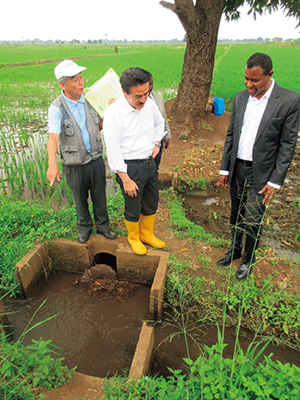 Japan's Project for Supporting Rice Industry Development in Tanzania “TANRICE”/Inspection of the local site by State Minister for Foreign Affairs Sato (August 2, Kilimanjaro, Tanzania)
Japan's Project for Supporting Rice Industry Development in Tanzania “TANRICE”/Inspection of the local site by State Minister for Foreign Affairs Sato (August 2, Kilimanjaro, Tanzania)E Approaches in the Area of Water
Japan has continuously been the largest supporting country in the area of water since the 1990s and has implemented high quality assistance utilizing Japan's experiences, expertise, and technologies. Japan proactively participates in discussions in the international community, and tackles global issues in the area of water based on its contributions to date.
(2) Global Health
Overcoming health issues that threaten lives and hinder all kinds of social, cultural and economic activities is a common global challenge directly linked to human security. Japan advocates human security, as a foundation of the “Proactive Contribution to Peace,” and has acted in support of that principle. Japan regards health as a central element of human security. Japan has become a society of the most healthy and active ageing and is further expected to play a proactive role in the area of health. Japan aims to realize an international community that improves people's health as well as ensures the right to health through assistance in the area of global health.
Under this principle, Japan has achieved remarkable results in overcoming health issues such as infectious diseases, maternal and child health, and nutrition improvements through cooperation with a number of countries and various international organizations, including the World Health Organization (WHO), the World Bank, the Global Fund to Fight AIDS, Tuberculosis and Malaria (the Global Fund), Gavi, the Vaccine Alliance (Gavi), the United Nations Population Fund (UNFPA), the United Nations Children's Fund (UNICEF), and the Global Health Innovative Technology Fund (GHIT).
Japan demonstrated leadership and took the lead in international discussions based on the “Basic Design for Peace and Health,” a theme-based policy for the Development Cooperation Charter formulated in 2015, and bearing in mind the achievement of Universal Health Coverage (UHC) that ensures the provision of basic health services throughout a life for everyone.
Leaders and ministers of various countries as well as heads of international organizations participated in the UN General Assembly High-Level Meeting on Ending TB in September, and affirmed the political commitment to promoting measures for achieving the target set out in SDG 3, Target 3.3 (target for infectious diseases, etc.) to end tuberculosis by 2030. The political statement was approved at the opening ceremony, clearly setting out efforts to strengthen measures to end tuberculosis, secure funds for these measures, strengthen research and development, and strengthen frameworks to verify progress. Minister of Health, Labor and Welfare Kato, who participated in this meeting, introduced Japan's long track record in engaging in international technical cooperation in tackling tuberculosis as well as providing financing support to international organizations, and expressed Japan's intentions to continue contributing in this area going forward.
(3) Labor and Employment
It is important to raise income levels through employment, in order to raise the living standards of those living in poverty. Against the background of an expanding supply-chain worldwide, it is necessary to put effort into developing the labor environment, and to realize “decent work” (work that is of an acceptable quality for motivated human beings) around the world. The realization of “decent work” has been positioned as a primary objective of the activities of the International Labor Organization (ILO), which marks its centenary year in 2019.
In view of this, Japan is also engaged in development cooperation in the field of labor. In 2018, Japan offered technical cooperation to developing countries in the Asia Pacific region, including support for the urgent creation of employment in the aftermath of a natural disaster, the development of labor laws, and improvement of enforcement systems for labor, health and safety, by making voluntary contributions to the ILO and providing support to networks of international labor organizations.
In June, the first Japan-ILO Annual Strategic Consultation Meeting (Geneva, Switzerland) was held. During this meeting, Japan and the ILO affirmed the following three key points, among other matters: (1) further strengthening cooperation on the “Future of Work” initiative; (2) Japan's financial and human resource contributions to supporting development cooperation in the labor sector to date, and further strengthening of the partnership; and (3) taking concrete, joint action toward further increasing the number of Japanese staff in the ILO.
(4) Environmental Issues and Climate Change
A Global Environmental Issues
There is growing awareness internationally of the importance of efforts to address the global environmental issues. For example, the 2030 Agenda sets out goals for the environmental sector. Japan is fully engaged in conserving the natural environment and realizing sustainable development, through its active participation in negotiations and encouragement of other parties in international organizations concerning multilateral environmental treaties and environmental matters.
(A) Conservation of the Marine Environment
The problem of marine plastic litter is a pressing issue that has a potential impact on marine ecology, tourism, fisheries, and human health. In recent years, it has become increasingly important to address this issue. At the G7 Charlevoix Summit held in June, Prime Minister Abe spoke about the need to tackle this issue as a challenge to the entire world, including developing countries, as well as the vital need to spread countermeasures such as 3Rs (reduce, reuse, recycle) and capacity building for waste disposal internationally. He also declared that Japan will address this issue at the G20 Osaka Summit in 2019.
Furthermore, at the ASEAN Plus 3 (Japan, China, and the Republic of Korea) Summit held in November, Prime Minister Abe advocated the “ASEAN+3 Marine Plastics Debris Cooperative Action Initiative,” which was welcomed by all the countries. Under this initiative, Japan, in cooperation with China and the ROK, will provide support for measures against marine plastics debris undertaken by ASEAN countries. This support will take the form of capacity building and infrastructural development related to 3Rs and waste disposal, and support for the development of action plans by individual countries. At the Japan-ASEAN Summit held in November, Prime Minister Abe also announced the expansion of support for ASEAN countries toward tackling the problem of marine plastics litter.
From the perspective of contributing to the realization of the SDGs, the High-Level Panel for a Sustainable Ocean Economy was established under the leadership of Norway to engage in discussion about the conservation of the marine environment, the fishery industry, and the utilization of marine resources, among other topics. The leaders of 12 maritime nations, including Prime Minister Abe, are participating in this Panel. In September, the first meeting of this Panel was held in New York, U.S. In the message that Prime Minister Abe delivered at this conference, he pointed out the importance of tackling the issue of marine plastic litter, responding to the impact of climate change on the oceans, and putting in place measures to counter illegal, unreported and unregulated (IUU) fishing.
In October, the 23rd Northwest Pacific Action Plan (NOWPAP) Intergovernmental Meeting was held in Moscow, Russia. The NOWPAP framework is a cooperative framework for the conservation of the marine environment of the Sea of Japan and the Yellow Sea, and involves Japan, China, the ROK, and Russia. During the meeting, a discussion was held on matters such as the evaluation framework for the medium-term strategy from 2018 to 2023, and NOWPAP's contribution toward the achievement of SDG 14 (Conserve and sustainably use the oceans, seas and marine resources).
(B) Conservation of Biodiversity
In recent years, illegal trade of wildlife, including elephants and rhinoceros, is becoming an increasingly severe issue. It is also drawing the attention of the international community as one of the sources of funding for international terrorist organizations. State Minister for Foreign Affairs Abe attended the fourth International Conference on Illegal Wildlife Trade held in London, UK, in October, and introduced Japan's proactive efforts in tackling the illegal trade of ivory, which the international community has shown particular concern for. Specifically, Japan tightened its regulations on the domestic ivory transactions in June, and announced that it will continue to enforce stringent management of domestic ivory transactions at a level on par with major countries. It was also announced that Japan promotes support for anti-poaching measures of elephants in range countries.
In conjunction with the 13th Meeting of the Conference of the Parties to the Ramsar Convention on Wetlands (COP13) in October, which addressed the importance of conserving wetlands against pressures of urbanization and climate change, Japan designated two new wetlands under the Convention at Shizugawa Bay in Miyagi Prefecture and Kasai Beach Park in Tokyo.
In November, the 54th Session of the International Tropical Timber Organization (ITTO) Council was held in Yokohama, to promote sustainable forest management.
In November, the 14th Meeting of the Conference of the Parties to the Convention on Biological Diversity (COP14) was held in Sharm El-Sheikh, Egypt. During the meeting, it was decided that an open-ended working group and regional workshops will be convened as a part of the process toward the review of global goals on biodiversity after 2020, scheduled to be adopted at COP15 in 2020. In addition, discussions were held on a wide range of topics including digital sequence information on genetic resources and synthetic biology.
(C) International Management of Hazardous Chemicals / Hazardous Waste
In November, the 30th Meeting of the Parties to the Montreal Protocol on Substances that Deplete the Ozone Layer, was held in Quito, Ecuador. At the meeting, discussions were held on the related matters including the implementation of the amended Protocol that added hydrofluorocarbons (HFC) to the list of controlled substances, which would enter into force on January 1, 2019. In December, the Government of Japan deposited the Instrument of Acceptance of the amended Protocol with the United Nations, thus became a party to the amended protocol at the time of its entry into force.
In November, the second meeting of the Conference of the Parties for the Minamata Convention on Mercury was held in Geneva, Switzerland. Japan, as a member of the Bureau responsible for the management of the Convention representing the Asia and Pacific Region, contributed to the smooth implementation of the meeting, and was actively engaged in the international rule-making on mercury management including by submitting three draft resolutions together with EU and the U.S.
B Climate Change
(A) The Paris Agreement, and the 24th Session of the Conference of the Parties to the United Nations Framework Convention on Climate Change (COP24)
Global efforts are essential in reducing greenhouse gas emissions that cause climate change; however, the Kyoto Protocol adopted at the third session of the Conference of the Parties to the UN Framework Convention on Climate Change (COP3) in 1997 required only developed countries to reduce greenhouse gas emissions. The Paris Agreement was adopted at COP21 held in Paris in December 2015. The Paris Agreement is a fair and effective framework that provides that parties communicate their nationally determined contributions to greenhouse gas emission reductions and undertake efforts toward the achievement of such goals regardless of whether they are developed or developing countries. The Agreement entered into force in November 2016, and has been ratified by more than 180 countries including Japan (as of December 2018). In June 2017, the U.S. announced its intention to withdraw from the Paris Agreement, but it has continued to participate in climate change negotiations at COPs and other fora.
Upon the adoption of the Paris Agreement, negotiations commenced on the implementation guidelines of the Agreement toward its full implementation after 2020. The implementation guidelines of the Paris Agreement were adopted at COP24 held in Katowice, Poland, in December 2018 based on discussions on each agenda item such as mitigation, adaptation, transparency frameworks, market mechanisms, and finance. Japan actively participated in the negotiations for each item, and contributed to the establishment of common rules for all countries in line with the spirit of the Paris Agreement. At COP24, the Talanoa Dialogue3 was held as a ministerial-level discussion to stocktake the status of efforts in reducing greenhouse gas emissions worldwide while aiming to enhance ambitions. Minister of Environment Harada participated as Japan's representative, and actively introduced Japan's technology as well as its track records in international cooperation.
- 3 “Talanoa” is a Fijian word (Fiji is the chair of COP23) meaning comprehensive, participatory, and transparent dialogue process.
(B) Efforts in Supporting Developing Countries
Developed countries including Japan have provided various supports for developing countries so that those countries can implement sufficient climate change measures. Those supports include financial cooperation, capacity building, and technology transfer. From such perspectives, the Green Climate Fund (GCF) also plays an important role as a multilateral fund that provides support to developing countries for greenhouse gas emission reductions and adapting to the impact of climate change. Japan has contributed funds based on the Act on Contribution to the Green Climate Fund (GCF) and the Accompanying Measures enacted in 2015, has sat on the board to the GCF, and has participated actively in its management including the selection of support projects. By December 2018, the GCF Board has approved 93 support projects.
(C) Joint Crediting Mechanism (JCM)
The JCM is a mechanism for contributing to worldwide global warming measures, by quantifying contributions of Japan to GHG emission reductions or removals, and using them to achieve Japan's own emission reduction targets, through the application of its excellent low carbon technologies, as well as the implementation of measures in developing countries. As of December 2018, Japan has established the JCM with 17 partner countries, and implemented more than 120 projects related to the reduction or removal of greenhouse gases. In 2018, the initiative has steadily produced results, such as through the issuance of credits from projects in Mongolia, Viet Nam, Palau, Indonesia, and Thailand.
(D) Japan's efforts in Climate Change and Fragility Risk
The view that climate change can have an impact on the stability of economies and societies in each country has been growing increasingly prevalent in recent years, alongside with growing interest in its impact on security such as conflicts and peacebuilding. Discussions have also been held at fora including the G7 Foreign Ministers' Meeting process, on the theme of climate change and fragility. As a part of its initiatives on the fragility risk of climate change, Japan held the International Conference on Climate Change and Fragility in the Asia-Pacific Region in July 2018 in Tokyo, where it shared with participants the trends in international discussions on climate change and security as well as business, and deepened discussions on the fragility to climate change in the Asia Pacific region, crisis management by implementing corporations, impact on investment, and approaches that should be taken by governments, local governments, and corporations toward risks that could arise in the future.
(E) Climate Change Measures by Non-State Actors
Measures by non-state actors such as private corporations, local governments, and NGOs are also important in tackling climate change, in addition to actions taken by national governments. This importance has also been raised in past COP decisions. In Japan as well, corporations have made further progress in their efforts, as demonstrated by keen activities of the Japan Climate Leaders' Partnership (Japan-CLP), a corporate group that aims to take proactive action in the area of climate change, as well as the increase in the number of Japanese corporations participating in the international initiative “RE100,” whose member corporations have established the goal of procuring 100% renewable energy for the electricity required in the operation of their businesses. Backed by this heightened momentum in Japan, climate change initiatives in Japan are showing further progress, such as with the launch of Japan Climate Initiative (JCI) in July, a network of non-state actors that aims to realize decarbonization. Japan aims to advance climate change diplomacy in cooperation with such initiatives by non-state actors.
Teruyuki Ohno, Japan Climate Initiative Secretariat, Executive Director, Renewable Energy Institute
Since the establishment of the Paris Agreement in 2015, growing attention has been paid to “non-state actors,” diverse agents besides nations that can work to realize a decarbonized society, including companies, local governments, and NGOs. This is because these actors have a decisively important role to play toward attaining the ambitious goal of effectively zero emissions of greenhouse gases by the middle of this century, given their central presence in actual economic activities and people's daily lives.
On July 6, 2018, Japan Climate Initiative, a network organization for these non-state actors, was established. At the time of its establishment, there were 105 participating entities, including major Japanese companies, small and medium-sized enterprises (SMEs) who underpin regional economies, various local government organizations from large cities to rural areas, consumer groups, and environmental NGOs. Membership has steadily risen since then and already more than tripled by the end of 2018.
The requirement for a JCI membership is to accept the founding declaration to “Join the front line of the global trend for decarbonization from Japan.” The declaration states that members will strengthen their efforts to “demonstrate global leadership in achieving the well-below-two-degree target through our own activities,” and enhance Japan's commitment to climate efforts in the international community.
JCI held its first domestic event, “Japan Climate Action Summit,” on October 12, 2018. Many key people on the front line of climate change measures, such as corporate executive officers and top local government officials, engaged in enthusiastic discussions about bolstering future activities. The Summit also included a Top Leaders Session with corporate top executives and local government heads, and more than 700 attendees from around Japan were able to experience the vibrant atmosphere for themselves.
Communicating the activities of Japan's non-state actors to the world is one of JCI's important missions. Many JCI members participated in the Global Climate Action Summit (GCAS) held in San Francisco in the U.S. in September and COP24 in Poland in December, and introduced activities by Japanese companies and local governments in presentations at various events during these conferences.
Following Japan's example, non-state actors in other countries, such as Mexico and Argentina, have formed their own networks as well. Meanwhile, the U.S. has the “We Are Still In” network that promotes measures for tackling climate change, against the Trump administration's intention to withdraw from the Paris Agreement. In 2019, Japan is hosting the G20 Summit, which will turn the world's attention to Japan. JCI aims to collaborate with such networks in various countries and strengthen initiatives for realizing decarbonized societies in Japan and worldwide.
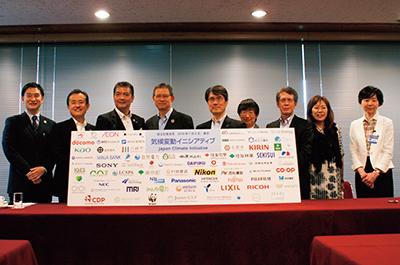 JCI founding press conference (July 6; Photo: JCI)
JCI founding press conference (July 6; Photo: JCI)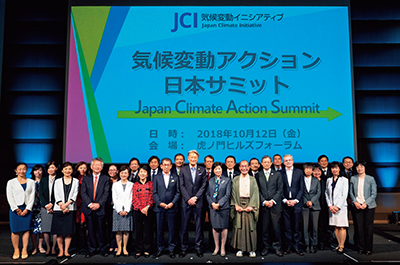 Japan Climate Action Summit (October 12; Photo: JCI)
Japan Climate Action Summit (October 12; Photo: JCI)(5) Arctic and Antarctic
A Arctic
(A) Current State of the Arctic, and Japan's Arctic Policy
There is a risk that rapid changes in the Arctic environment caused by global warming will have a drastic and irreversible impact on the ecology and the lives of those living in the Arctic, including indigenous peoples. At the same time, as the decreasing amount of sea ice has expanded the navigable area, there have been growing economic opportunities such as the use of the Northern Sea Route and the development of resources.
Japan's Arctic policy is based upon “Japan's Arctic Policy,” approved by the Headquarters for Ocean Policy in 2015. The Third Basic Plan on Ocean Policy, adopted by the Cabinet in May 2018, established a specific section on the Arctic Policy for the first time and positioned it as one of the main measures in Japan's ocean policy.
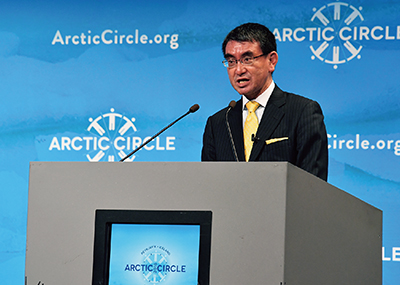 Keynote speech by Foreign Minister Kono at the Arctic Circle (October 19, Reykjavík, Iceland)
Keynote speech by Foreign Minister Kono at the Arctic Circle (October 19, Reykjavík, Iceland)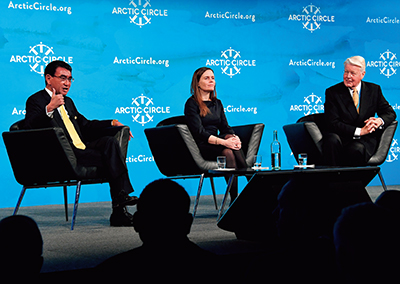 Arctic Circle
Arctic CircleThe Arctic Circle is an international meeting founded by former Iceland President Grímsson and other leaders in 2013, attended by government officials, researchers, business people, and others. In October 2018, Foreign Minister Kono attended the Arctic Circle for the first time as the Foreign Minister of Japan, and delivered a keynote speech on Japan's Arctic policy.
In the speech, Foreign Minister Kono emphasized the particular importance of clarifying the mechanism of environmental changes in the Arctic and understanding its impact in order for the international community to appropriately address the Arctic “issue” of adverse impact on the ecosystem, while also recognizing the “opportunities” emerging in the Arctic, such as development of natural resources. Furthermore, he proposed the idea of an “Ideal Arctic” for the international community that consists of (1) clarifying the mechanism of environmental changes and sharing the responses within the international community, (2) pursuing sustainable economic use while respecting the ecosystem and the life of indigenous people, and (3) promoting international cooperation in a peaceful and orderly manner based on the rule of law. Foreign Minister Kono delivered a message that Japan will promote cooperation with all stakeholders to realize an “Ideal Arctic.” Foreign Minister Kono also presented the following three aspects in Japan's specific efforts and direction for realizing an “Ideal Arctic” - (1) scientific research (promotion of the “Arctic Challenge for Sustainability (ArCS)” project, cooperation with Arctic countries on mitigating black carbon emissions), (2) sustainable economic use (encouraging Japanese companies to pay more attention to Arctic businesses (Hokkaido is a gateway from Asia to the Northern Sea Route), comprehensive energy development cooperation with Russia in the Arctic region, and active participation in the formulation process of international rules for the Arctic), and (3) rule of law (confirmation of “a rule-based maritime order”).
“Japan's Arctic Policy” was formulated in 2015 and Japan has been actively promoting efforts in the Arctic. The Third Basic Plan on Ocean Policy, adopted by the Cabinet in May 2018, established a specific section on the Arctic Policy for the first time and positioned it as one of the main measures in Japan's ocean policy. With regard to the Arctic Science Ministerial Meeting, which was held in October with the aims of promoting research and observations and responses to major social issues in the Arctic, as well as further promoting scientific cooperation among relevant countries and with groups of indigenous peoples, it was decided that the next meeting would be held in Japan in 2020 co-chaired by Japan and Iceland. This would be the first meeting held in Asia.
Based on these engagements, Japan will steadily implement the message delivered to the international community by Foreign Minister Kono and contribute to solving global issues related to the Arctic, while securing the interests of Japan and the international community.
(B) Japan's International Activities on the Arctic
In October, Foreign Minister Kono attended the Arctic Circle4 for the first time as the Foreign Minister of Japan, and delivered a keynote speech on Japan's Arctic Policy at the meeting.
Japan's Ambassador in charge of Arctic Affairs attended the Senior Arctic Official meetings of the Arctic Council (AC), and the international conferences on the Arctic organized by Finland, Norway, Poland, China, and the Republic of Korea, and presented Japan's engagements and thoughts over the Arctic. Furthermore, he held consultations with relevant countries, including bilateral Arctic consultations with Denmark and the EU. The third Trilateral High-Level Dialogue on the Arctic among Japan, China and the ROK was held in June in Shanghai. The dialogue was launched at the Sixth Japan-China-ROK Trilateral Summit held in 2015. In this meeting the Joint Statement reaffirming the importance of promoting trilateral Arctic cooperation (particularly in the field of scientific research) was adopted. Japan also participates actively in establishment of international rules on the Arctic. One good example is the Agreement to Prevent Unregulated High Seas Fisheries in the Central Arctic Ocean, signed by nine countries and one organization including Japan in October 2018.
Furthermore, Japan promotes international cooperation on the Arctic with the relevant countries including the Arctic countries. Through the Arctic Challenge for Sustainability (ArCS) project launched in FY2015, Japan promotes international cooperation for research and human resource development at research and observation stations in the U.S., Canada, Russia, Norway, and Greenland (Denmark). Japan also sent its researchers to the AC working groups specialized in specific themes, where they present outcomes of their research on the Arctic and contribute to discussions.
In the area of economic use, Japan encourages more Japanese companies to pay attention to Arctic business in order to take advantage of the Northern Sea Route. As demonstrated by the Yamal LNG project in Russia, Japan is advancing comprehensive energy development cooperation with Russia in the Arctic Region while giving full consideration for the Arctic environment.
- 4 Established by former Iceland President Grimsson and others in 2013, this international conference is attended by about 2,000 participants including government representatives, researchers, and business people. It is the Arctic version of the Davos Summit. Japan has been participating since the first conference with the attendance of the Ambassador in charge of Arctic Affairs and other delegates. In addition to presenting speeches at the plenary session, Japanese researchers also presented the outcomes of their scientific research at the breakout session.
B Antarctic
(A) The Antarctic Treaty
The Antarctic Treaty adopted in 1959 sets forth the following three basic principles: (1) the use of the Antarctica for peaceful purposes, (2) freedom of scientific investigations and international cooperation, and (3) a freeze on territorial rights and claims.
(B) The Antarctic Treaty Consultative Meeting (ATCM) and the Protection of Antarctic Environment
At the 41st Antarctic Treaty Consultative Meeting (ATCM 41) held in Buenos Aires, Argentina, in May 2018, discussions were held on recent issues, including the impact of the increase in the number of tourists on the Antarctic environment, taking into account the yearly increase in the number of travelers to the Antarctic region for tourism and other purposes.
(C) Japan's Antarctic Observation
As for Japan's Antarctic observation activities, based on the 9th six-year plan of the Japanese Antarctic Research Expedition (2016 to 2021), Japan is undertaking efforts to elucidate the role and impact of the Antarctic region on the global system in the past and future, and in particular, to elucidate the actual conditions of global warming and its mechanisms. To that end, in addition to long-term continuous observation, it is also implementing various research and observation activities, including observation using large aperture atmospheric radar.


